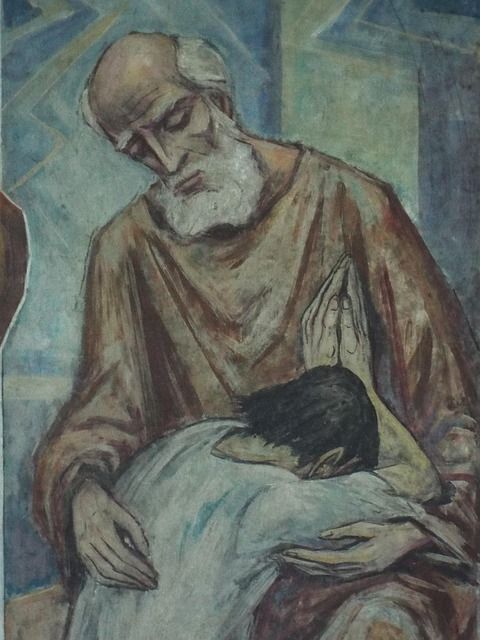
What are your prodigal moments?
We all know the parable of the prodigal son, as it is most commonly titled, but is it more descriptive to refer to it as the parable of the prodigal father? For the word prodigal is defined as wastefully extravagant, yielding abundantly or recklessly spendthrift conjuring up images of a banquet table laden with delicacies such as the new varieties of strawberries that are prices by the berry rather than the pound, Prodigality is a Babette’s Feast image where no detail is overlooked or cost spared—fitting for a gospel during Lent leading up to the sacrificial love of God for us culminating in the crucifixion of Jesus.
It’s hard for us to wrap our minds around that kind of self-giving love as it was for the disciples to understand why Jesus must suffer and die as he foretold his passion. We recall Peter’s proclamation of the identity of Jesus as the Messiah, the son of the living God for which Jesus names him the rock on which the Church will be built. Perhaps that is one of Peter’s prodigal moments. But when Peter rejects that Jesus must suffer and die, Jesus calls him Satan and a stumbling block. Well—not so prodigal.
There are many places in the New Testament in which Jesus seems frustrated that the disciples just don’t understand. This is also true of the Pharisees as well as most of the crowds that surround him. Jesus’ use of parables often springs from those attempts to teach using stories that would be easily understood by all and often those that shock and draw a strong reaction.
The parable unfolds from Jesus’ encounter with the Pharisees—the gatekeepers of law and their interpretation of morality. Highly critical of Jesus’ behavior and apparent disregard for ritual purity (i.e. not being concerned at becoming unclean via eating with sinners and—God forbid—tax collectors) they grumble and seek ways to discredit his authority and popularity with the people. In this context Jesus tells the parable of the shocking behavior of a younger son seeking his share of inheritance prior to his father’s death. Good sons did not do this.
Some of you may have read Daniel Horan’s Give Us This Day reflection for today citing the insights of New Testament scholar Amy-Jill Levine. Though a New Testament scholar, Dr. Levine is an observant Jew, and she brings that perspective to her scholarship. When I lived in California and was part of the Newman Center community, the university area of congregations of various religions and denominations sponsored an annual interfaith scholar weekend and Dr. Levine was the guest speaker twice.
Her insights highlight the uniquely Jewish perspective and style that Jesus uses with the parables as well as the lack of resolution she points out with the parable of the prodigal son. This intentionally uncomfortable story ends without resolution for the primary characters. It gives us the gift of applying it to our own lives and the unresolved stories within our own families.
A few weeks ago, my daughters and nieces hosted a milestone birthday party for my son in treatment for lymphoma—cancer which has surfaced in many areas of his body. I participated via facetime and photos and videos sent to me the next day. In one video, he reflected that a year ago he did not know that he would be alive this year, let alone celebrating life in such a joyous way. There were a lot of tears.
When we talked later that week, he talked about family drama—saying that every family has some, but deals with it in different ways…mostly we all get along very well recognizing that there have been times we have moved through that did leave some pain—that it was how each person made conscious decisions about how they were able to move through difficulty without becoming paralyzed by resentment and old hurts that defined our ability to grow. As Horan calls the parable of the prodigal son a…”complicated, dysfunctional, and fraught family dynamic that is far more relatable than we might realize. “
We have heard this parable just a week ago on Saturday, and the same theme of unresolved endings is referenced in the reflection, As the Parable Turns—a parody of the title of a popular, and long-running soap opera. As Luke Timothy Johnson calls the parable a “virtual novella,” Peter Dwyer’s reflection emphasizes the invitation to ‘come to life again’ and stresses that the invitation is for all of us. Will we seize hold of that invitation to life? Can we recognize that we are made for reconciliation?
A final reflection focuses on the illustration on the back cover of the March issue of Give Us This Day by Edward Riojas. The illustration is a contrast in dark and light; skulls and the crucifixion on one side and the dove and resurrection on the other; smoke, destruction and ominous skies on one side and brilliant sunlight, lavish fields and an open gate yielding to the returning son and the father running to greet him. We all have our moments of darkness and light.
In his Lenten address, Pope Francis has challenged all of us to reflect on how we welcome the marginalized, the migrant, the poor, perhaps our own relatives who have become alienated from the rest of the family. On this Laetare Sunday, we are all challenged to rejoice when the lost return, when we reconcile with another to mend a damaged relationship or when the stranger appears in our lives. Then we may truly experience our prodigal moments and rejoice. 3/2025
